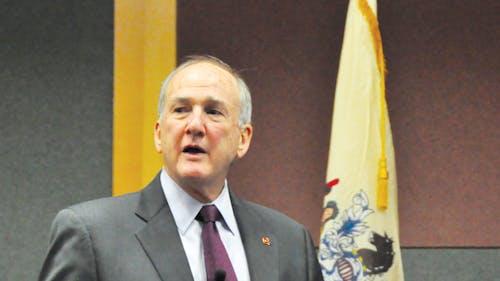Student groups launch ‘Where RU Barchi’ club

Luma Hasan said after the Condoleezza Rice protests last May, the administration treated her “like a child” and gave the protestors a “dismissive” attitude.
But student and faculty relations have still been slow to develop, and several student groups have formed a coalition to demand greater communication from Rutgers President Robert L. Barchi.
Barchi’s lack of responsiveness halted the agendas of several student activist groups on campus, including Rutgers’ chapter of the National Organization for the Reform of Marijuana Laws, said Suraj Patel, a member of the organization.
It was the same for Kaila Boulware, a member of Women Organizing Against Harassment, whose group advocates for adding a more thorough sexual conviction vetting process when hiring prospective faculty and staff.
Sivan Rosenthal, a member of Rutgers United Students Against Sweatshops, decided to combine several Rutgers student groups to start a group called “Where RU Barchi.”
The idea transitioned from conversation topic to fleshed-out organization at the first coalition meeting last week.
Rosenthal, a School of Arts and Sciences sophomore, formed “Where RU Barchi” as a movement to improve relations between Barchi and the Rutgers student body. The group wants Barchi to start holding regular office hours so students have institutional means to talk about campus issues.
She understands Barchi has many other obligations, especially since the University has joined the Big Ten, but she does not want the Big Ten to facilitate his growing disconnect from students.
“The coalition is, in part … ensuring students still have a voice in what’s happening in the changes that are being made [at Rutgers], especially since Barchi is the one making them,” she said.
Rosenthal mentioned he recently cut $2 million dollars from the library budget, a move that angered some student and faculty members.
WRUB wants to let the administration know that the changes being made to Rutgers should be relevant to students, she said, and that the changes should also have the approval of students.
“We want to make sure this University is for the students and not the donors,” she said.
In an email issued at the beginning of the fall semester, Barchi said he would not meet with student groups this semester because he was touring to meet with donors who would back the University’s merge into the Big Ten Conference.
Patel, a School of Arts and Sciences junior, found Barchi’s email “unacceptable.”
Barchi has always been difficult to talk to, he said, but it is more difficult than ever to reach him now.
Hasan, a member of WRUB, said student activists pushed to open up greater channels of communication with the administration last semester, particularly during the widely discussed Rice protests in May.
Yet this semester, Hasan, a School of Arts and Sciences senior, got the impression the administration was making a conscious attempt to shut students out.
The Rutgers administration is constantly saying it encourages open dialogue, inclusivity and shared governance, she said, but ironically the administration has done the opposite every time it has happened.
High-ranking administrators were difficult to meet with before the protest, but it has become harder to meet with them a semester later.
Now, the University has not made any changes to improve communication between students and the administration. Hasan hopes the request for Barchi to start scheduling office hours will be well received when WRUB formally takes its proposal to the administration in a month’s time.
Boulware, a School of Arts and Sciences senior, said WOAH met with Barchi last semester to discuss adding a vetting process when hiring potential faculty and staff members.
The issue became of importance to WOAH since Rutgers nearly hired Peter Ludlow, a former professor at Northwestern University accused of sexually assaulting a student at his apartment in February 2012. But Barchi has not taken any action since that time.
“One thing I would say is that, you know, I understand Rutgers is in the Big Ten, we’re getting a lot of media attention, he’s going on this tour and getting funding and that’s well and good, but his main priority should be the concerns of the students,” she said.
The students, rather than administration or faculty, are the people who pay tuition, she said. They are the ones who go to Rutgers, live in New Brunswick and Piscataway and invest their lives in the University.
She said Barchi could improve his role as president at Rutgers just by doing a few things.
“Pay more attention to the students,” she said. “Listen to what we have to say. Work with us — let’s work together on getting things done. We invest in Rutgers … a lot of us breathe Rutgers. The students are Rutgers, so students need more say in what happens [here.]”



